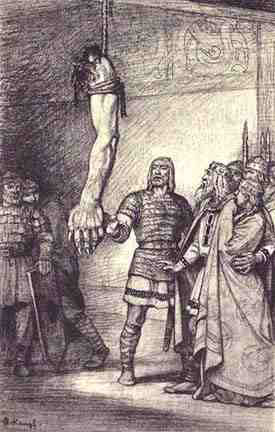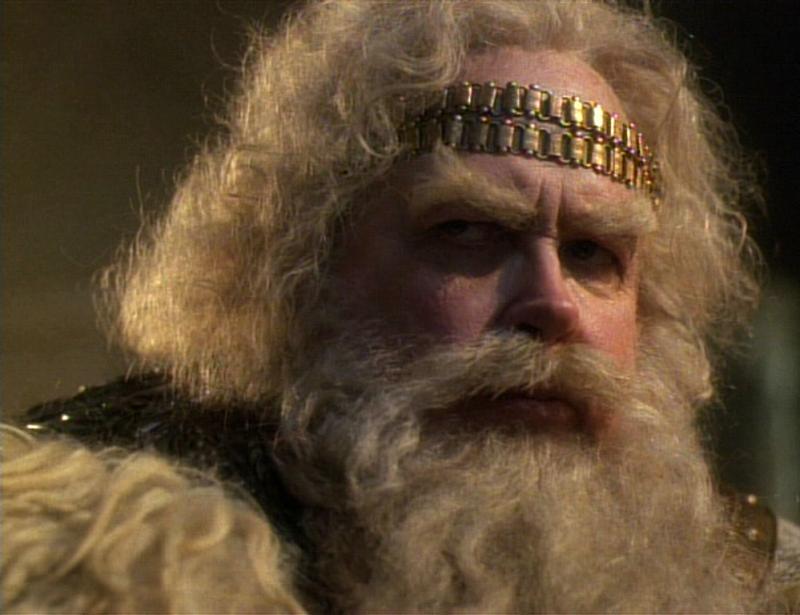Search This Blog
Tuesday, December 10, 2013
The Coming Of Beowulf
There seem to be many strange creatures roaming the unfortunate lands described in Beowulf, but the three that Beowulf decides to eradicate have a definite penchant for destructive acts toward humans. They each have their own reasons for their evil deeds. The dragon wreaks havoc because his treasures are stolen, Grendel's mother is seeking revenge for the mutilation and death of her son, and Grendel eats people because the inhabitants of Heorot sounded like they were having too much fun in their great hall. People accept bloodshed and strife as part of life unless it comes from an outside source. They see warfare against other humans as politically necessary and often glorious, but if any non-humans try to take part in the action, they deem this horrific and unnatural.
I find the methods used to fight the two semi-human monsters very interesting. Beowulf decides to fight Grendel without arms. As Grendel does not use weapons to bite people in half and lap their blood, it will bring the hero greater honor to slay the foe with his bare hands; this is partly because it would be dishonorable to kill an unarmed man, no matter how dangerous or evil he might be, and partly because Beowulf's vanity will not allow him to miss an opportunity for even greater glory, even if it means his death and disaster for the innocent people he professes to defend. But Beowulf proves his incredible prowess and manhood by ripping poor Grendel's arm off and leaving him to run off and die. One can hardly be surprised by this inhumane treatment of an inhuman monster, however, when one considers that our gallant hero pretended to be asleep long enough for Grendel to eat one of the men in the hall, rather than intercepting the "hell-being" the moment he entered. Nonetheless, everyone rejoices and Beowulf receives such honor as they believe he deserves.
Shortly after, Grendel's mother comes along to avenge her son's partial dismemberment. She is described as possessing the form of a woman; as her son is described as having the form of a man but larger than any man known and no such comparison is used in her description, it is possible that she is no larger than a regular woman. Regardless, she is shown an ineffectual avenger, managing to drag off her son's arm and killing only one man before fleeing the scene (remember Grendel had taken thirty men on his first foray to Heorot). Once again, Beowulf agrees to destroy the accursed offender. Rather than waiting for her to return to the hall, he decides to seek her out. He does not simply go armed, but rather in full battle dress; the extraordinary attributes of the pieces he wears are described in detail. This gear will stop anything; it ought to be able to stop a mean-spirited female. She drags him to her lair, where he is out of the water and now has freedom of movement. However, he still does not fare well in the battle. His blade proves useless, so he decides to trust in his strength and grabs her by the hair in a classic gesture of male dominance. After throwing her to the ground, he cannot even maintain that advantage because she pulls him down and sits on top of him, stabbing at his armor with her knife. For some reason she lets him stand up, at which point he grabs one of her own blades and deals her a lethal blow to, and through, the neck.
King Hrothgar of Denmark, a descendant of the great king Shield Sheafson, enjoys a prosperous and successful reign. He builds a great mead-hall, called Heorot, where his warriors can gather to drink, receive gifts from their lord, and listen to stories sung by the scops, or bards. But the jubilant noise from Heorot angers Grendel, a horrible demon who lives in the swamplands of Hrothgar’s kingdom. Grendel terrorizes the Danes every night, killing them and defeating their efforts to fight back. The Danes suffer many years of fear, danger, and death at the hands of Grendel. Eventually, however, a young Geatish warrior named Beowulf hears of Hrothgar’s plight. Inspired by the challenge, Beowulf sails to Denmark with a small company of men, determined to defeat Grendel.
Hrothgar, who had once done a great favor for Beowulf’s father Ecgtheow, accepts Beowulf’s offer to fight Grendel and holds a feast in the hero’s honor. During the feast, an envious Dane named Unferth taunts Beowulf and accuses him of being unworthy of his reputation. Beowulf responds with a boastful description of some of his past accomplishments. His confidence cheers the Danish warriors, and the feast lasts merrily into the night. At last, however, Grendel arrives. Beowulf fights him unarmed, proving himself stronger than the demon, who is terrified. As Grendel struggles to escape, Beowulf tears the monster’s arm off. Mortally wounded, Grendel slinks back into the swamp to die. The severed arm is hung high in the mead-hall as a trophy of victory.
Overjoyed, Hrothgar showers Beowulf with gifts and treasure at a feast in his honor. Songs are sung in praise of Beowulf, and the celebration lasts late into the night. But another threat is approaching. Grendel’s mother, a swamp-hag who lives in a desolate lake, comes to Heorot seeking revenge for her son’s death. She murders Aeschere, one of Hrothgar’s most trusted advisers, before slinking away. To avenge Aeschere’s death, the company travels to the murky swamp, where Beowulf dives into the water and fights Grendel’s mother in her underwater lair. He kills her with a sword forged for a giant, then, finding Grendel’s corpse, decapitates it and brings the head as a prize to Hrothgar. The Danish countryside is now purged of its treacherous monsters.
The Danes are again overjoyed, and Beowulf’s fame spreads across the kingdom. Beowulf departs after a sorrowful goodbye to Hrothgar, who has treated him like a son. He returns to Geatland, where he and his men are reunited with their king and queen, Hygelac and Hygd, to whom Beowulf recounts his adventures in Denmark. Beowulf then hands over most of his treasure to Hygelac, who, in turn, rewards him.


Higlac

hrothgar



Higlac

hrothgar

Subscribe to:
Posts (Atom)